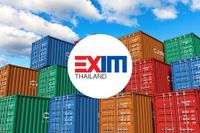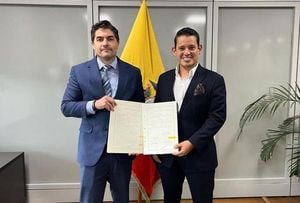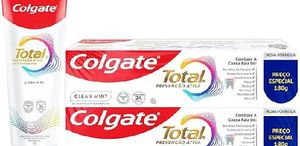In a bid to support Thai exporters grappling with the challenges posed by international trade dynamics, the Export-Import Bank of Thailand (EXIM BANK) has unveiled a series of financial promotions during the "MOF Journey 150 Years of Thai Ministry of Finance" event. This initiative, which runs from May 1 to May 3, 2025, at the Queen Sirikit National Convention Center, aims to bolster the resilience of Thai businesses amidst the backdrop of rising tariffs and global market fluctuations.
EXIM BANK is offering special interest rates and reduced fees to help exporters navigate the complexities of the current trade environment, particularly in light of the ongoing "Trump 2.0" tariffs that have significantly impacted trade relations. The event, marking the 150th anniversary of the Ministry of Finance, serves as a platform for EXIM BANK to reaffirm its commitment to promoting sustainable business practices.
Under the theme "150 Years of EXIM Trust, Delivering Goodness for Sustainability," the bank has rolled out two major promotional offers. The first offer celebrates the loyalty of its customers, providing a special interest rate reduction to 3.1% per annum for 310 long-standing clients, alongside a new customer incentive that lowers the initial fee to just 0.5% for loans applied for by May 31, 2025.
The second offer includes tailored financial products such as the White Starter loan with an interest rate starting at 5.60% per annum, the White Intermediate loan starting at 4.75%, and the White Advanced loan beginning at 3.75%. These initiatives are designed to assist businesses adhering to ethical practices while promoting sustainability.
Moreover, EXIM Export Clinic is set to provide consulting services to both importers and exporters affected by the U.S. reciprocal tariffs. This support includes information on managing business operations under the new tariff regime and strategies to mitigate the impacts of these trade policies.
In parallel, the Thai Chamber of Commerce has expressed urgent concerns regarding the shrimp export industry, which has been severely affected by disease outbreaks and high tariffs imposed by the U.S. and European markets. The chamber is advocating for immediate action to reclaim Thailand’s status as a leading global seafood exporter.
President of the Thai Chamber of Commerce, Sanan Angubolkul, highlighted the need for structural reforms to enhance the competitiveness of Thailand’s shrimp farming sector. The industry has faced significant challenges, particularly from Early Mortality Syndrome (EMS), which has drastically reduced shrimp production from nearly 600,000 tons to between 250,000 and 280,000 tons annually.
As a result, the chamber has proposed four key measures to revitalize the shrimp industry:
- Address the EMS problem in shrimp farms, which has been a persistent issue since 2010.
- Enhance marketing efforts both domestically and internationally, focusing on maintaining market share in established markets like the U.S. and Japan while exploring new opportunities in China and ASEAN.
- Promote negotiations for a Thailand-EU Free Trade Agreement to reduce trade barriers, especially after the EU revoked Thailand's GSP privileges in 2014.
- Mitigate the impacts of U.S. import tariffs, which currently threaten to impose a 36% duty on shrimp exports.
"What we want is not just support for local shrimp farmers but a systemic view of the shrimp industry’s challenges across the country," Angubolkul stated. "With the right support measures, we can reclaim our position as a global leader in high-quality seafood."
Meanwhile, the solar panel export sector is also facing a significant downturn due to new anti-dumping tariffs imposed by the U.S. Department of Commerce. Tariffs ranging from 375% to 972% are set to drastically reduce exports of solar panels and components from Thailand, which has relied heavily on the U.S. market for nearly 90% of its export value in this sector.
According to the SCB Economic Intelligence Center (EIC), these tariffs are expected to shrink exports to the U.S. by nearly 69% within the next year, as Thai producers struggle to compete with manufacturers in other ASEAN countries that are not subject to such high tariffs. The EIC has noted that the U.S. decision stems from concerns that Chinese manufacturers are using Thailand as a base to circumvent tariffs.
In light of these developments, SCB EIC has recommended that Thai solar panel manufacturers explore alternative strategies to mitigate the impact of U.S. tariffs. This includes sourcing raw materials from countries without trade disputes with the U.S. and expanding into markets with growing solar energy demands, such as India and Australia.
As Thailand grapples with these multifaceted challenges, the need for cohesive strategies and robust support systems becomes increasingly critical. Both the shrimp and solar panel industries exemplify the broader struggles faced by Thai exporters in a rapidly changing global landscape.
Ultimately, the success of these initiatives will depend on the collaborative efforts of government bodies, financial institutions, and the private sector. With the right framework in place, Thailand can not only weather the current storms but also emerge stronger and more competitive on the global stage.





